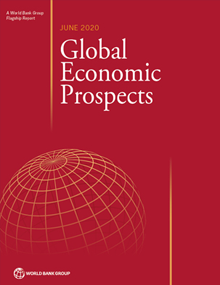Our knowledge, research, and data products provide a valuable global public good, offering relevant analysis and insights that are embedded in our operations, support informed decision making by countries, and guide the global development agenda.
Global Economic Prospects: Slow growth, policy challenges

Providing data to strengthen development knowledge
We bring together resources from across the data value chain, from data production to curation and analytics. Accurate and accessible data help countries strengthen service delivery, promote accountability, and monitor progress toward development goals. However, many of the poorest countries face challenges in collecting and using data, such as inadequate financing, insufficient use of statistical evidence by decision makers, and limited public access. We work to build institutional capacity in these countries and reduce gaps in the availability of core data that can inform evidence-based policy making and reforms. The next edition of the World Development Report, Data for Better Lives, will be released in early 2021. It will focus on how data can improve the lives of the poor in developing countries and will reflect on the current data landscape and the environment needed to enable the use of data while preventing misuse.
PovcalNet is an online analysis tool for global poverty monitoring that allows users to replicate the Bank’s official poverty estimates, calculate poverty measures under different assumptions, and assemble estimates for different groups of economies. In March 2020, we released revised estimates of global poverty from 1981 to 2015, and new poverty estimates for the reference year 2018 are now included for some regions. The estimates use data from more than 1,900 household surveys across 164 economies. Research suggests that COVID-19 may push about 100 million more people into extreme poverty, with Sub-Saharan Africa being the hardest hit.
The International Comparison Program is one of the largest statistical programs in the world, led by the Bank under the auspices of the UN Statistical Commission, with 176 participating economies. In partnership with regional, national, and international agencies, it collects and compares price data and GDP expenditures to estimate purchasing power parities (PPPs) of the world’s economies every three years. In May 2020, new PPPs for reference year 2017 were released, adjusting for differences in the cost of living across economies. Revised results for 2011, the program’s previous reference year, were also released, as well as estimates of annual PPPs for 2012–16. PPPs are key to analyzing poverty and competitiveness, as well as monitoring progress toward the Sustainable Development Goals.
The Development Data Partnership overcomes significant data gaps in development by facilitating collaboration among international organizations and companies, so that they can jointly create insights and tools that support better public services and infrastructure. It reduces transaction costs associated with data sharing, while increasing the transparency and accountability of public goods analytics. The partnership includes the IMF and the Inter-American Development Bank and supports more than 50 Bank operations. We have leveraged it to help map transit routes in Freetown, Sierra Leone; identify road safety risks in Nairobi, Kenya; understand access to employment in Dhaka, Bangladesh; and examine gender pay disparities in small and medium enterprises in emerging economies.
Using data to support the response to COVID-19
As part of our global response to the COVID-19 pandemic, the Bank quickly developed data tools and conducted research to better understand the pandemic and its impact on developing countries. The COVID-19 Mobility Analytics Task Force provides countries with data analytics on mobility that can inform mitigation policies to prevent the spread of the disease, working in partnership with mobile network aggregators, smartphone app developers, and data aggregators. Our coronavirus open data website provides streamlined, open access to relevant COVID-19 data, including a dashboard tool that allows users to analyze real-time global data alongside relevant indicators, such as health system capacity and access to basic handwashing facilities. Reflecting our commitment to open data, the website allows users, including developers, to access the data through APIs. It also provides data to the Humanitarian Data Exchange, in partnership with UNHCR.
We also developed COVID-19 Business Pulse Surveys to measure the impact of the pandemic on firms, companies, and public policy responses. By the end of fiscal 2020, data collection was planned or ongoing in 33 countries across six regions. The results are being used to inform the design of our COVID-19-response operations.